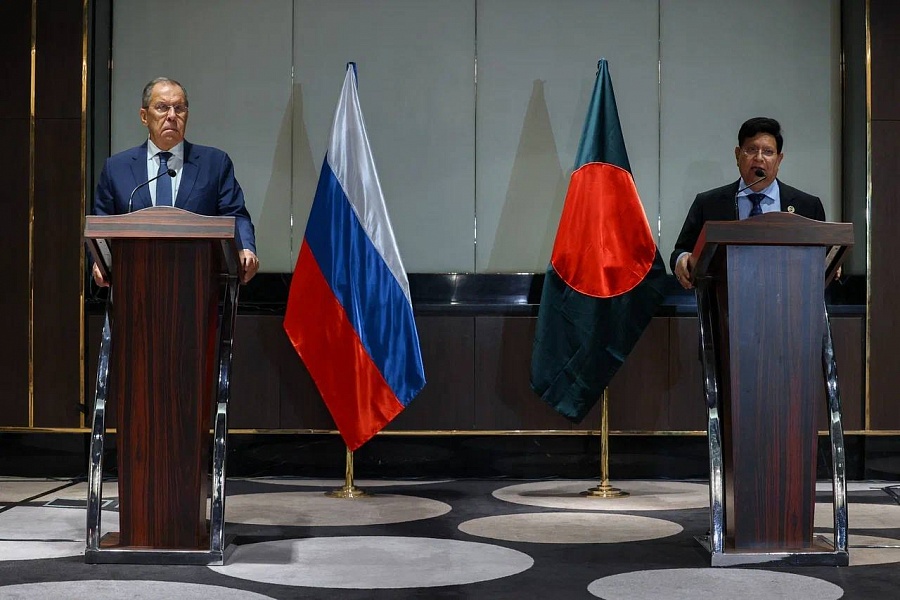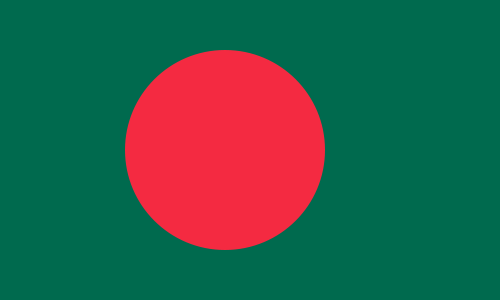 the Peoples Republic of Bangladesh
the Peoples Republic of Bangladesh
Foreign Minister Sergey Lavrov’s remarks and answers to media questions during a joint news conference with Foreign Minister of the People’s Republic of Bangladesh A.K. Abdul Momen following talks, Dhaka, September 7, 2023
Mr Minister,
Ladies and gentlemen,
I would like to express my gratitude for the invitation to visit the People’s Republic of Bangladesh to my colleague, Mr. A.K. Abdul Momen. We meet regularly, but this is the first time we have met in Dhaka. I have not had the opportunity to visit here before.
Bangladesh has been our long-standing and trusted partner in South Asia. For over half a century, our bilateral relations have been based on the principles of friendship, equality, and mutual respect. We are pleased to note that, despite the objective difficulties, including those related to the COVID-19 pandemic, we have maintained a high level of political dialogue between Russia and Bangladesh. Today, we agreed to intensify bilateral contacts across all areas.
We discussed the prospects for expanding trade and investment relations. Notably, Bangladesh is Russia’s second-largest trading partner in South Asia, with trade consistently exceeding $2 billion in recent years. In 2021, it came close to $3 billion. There was a slight decrease in 2022, which is being addressed by the Russian-Bangladeshi Intergovernmental Commission on Trade, Economic, Scientific and Technical Cooperation, which most recently met in March.
The construction of the Rooppur Nuclear Power Plant in Bangladesh is our flagship joint project. Today, we reaffirmed that the project was making good progress according to schedule, with the first nuclear fuel on track to be delivered and loaded in October.
There are promising prospects for continued cooperation in the gas sector. Gazprom International Limited has participated in drilling more than 20 wells and is prepared to continue this work.
Relevant agencies are discussing practical aspects of establishing regular large-scale supplies of liquefied natural gas and oil to Bangladesh. Wheat and fertiliser shipments are already underway, and today we discussed the possibility of transitioning from yearly to a longer-term basis. We are also interested in participating in Bangladesh’s Earth remote sensing system project.
We discussed humanitarian ties as well. Our colleagues thanked us for the significant increase in the number of annual scholarships granted to citizens of Bangladesh for them to receive higher education in Russia.
We also discussed the well-known issue of the presence of a large number of Rohingya refugees from Myanmar in Bangladesh. We support progress in achieving agreements within the framework of the ad hoc Consultative Working Group established between Bangladesh and Myanmar. We are convinced that external actors should confine their role to facilitating mutually acceptable bilateral agreements.
This is the approach practiced by the Russian Federation in its contacts with representatives of Myanmar, which we discussed today. We will continue this work. Some external actors are using involvement in this issue to exert pressure on one of the parties and to interfere in its internal affairs. I consider this not only counterproductive but also unacceptable for the well-being of the countries in the region and overall security in this part of the world.
We closely cooperate with Bangladesh in various international forums, including the UN, the ASEAN Regional Security Forum, the Conference on Interaction and Confidence-Building Measures in Asia, and other formats.
We appreciate that despite the unprecedented pressure exerted by the United States and its allies on all countries, including Bangladesh, regarding the “Ukraine issue,” our friends here adhere to a foreign policy that exclusively serves their national interests.
We have had a productive exchange of views and have outlined several practical steps that will allow us to achieve concrete results and strengthen our relations in various areas.
Question: Because of the sanctions Russia is suffering, we cannot transfer money from Bangladesh to your place, what alternative currency can be helpful in this case?
Sergey Lavrov: You mean that because Bangladesh cannot transfer money to Russia, Bangladesh is suffering? I think we are moving very quickly to a variety of transaction systems that will be based on national currencies, and not on the currencies of the countries who use them as a weapon.
Question: You just returned from the East Asia Summit. How would you assess the outcome of the event? The conflict in Ukraine was hardly a top priority on the ASEAN-EAS summit agenda. Apparently, the countries in the region have other concerns which are more important for them. However there have been reports that the US was rather insistent in trying to impose its own agenda. Did you see any attempts to pressure the Asian countries?
Sergey Lavrov: I believe that the 18th EAS was a success thanks to the tremendous effort of the Indonesian presidency. We strongly supported Indonesia’s efforts to ensure that the participants concentrated on the issues on the agenda of this forum. These included accelerating the sustainable development of the countries in the region, resolving food and energy security issues, increasing emergency preparedness, promoting a digital economy and other issues.
The final declaration, which was approved at the summit this morning, directs all ASEAN countries and their eight partners (which together comprise the East Asia Summit) to address precisely these problems. Fortunately, this was achieved despite the very intense attempts by our Western colleagues, who were unfortunately joined by some of their Asian partners from the region. They tried to undermine the constructive work of the summit by attempting to impose the Ukraine issue on the agenda under various pretexts. However, the summit participants must be given credit for being able to refute these attempts, and the East Asia Summits will continue to focus on its previously agreed upon agenda, which does not include any geopolitical problems. The resolution of any crisis or conflict is outside this summit’s purview. In the end, the spirit of ASEAN prevailed, as the group remained true to its principles of balancing everybody’s interests and reaching consensus.
As for the attempts to bring the Ukraine issue to the table at every event by our Western colleagues, most countries that want to focus on the specific work rather than support propaganda in support of the Kiev regime, which is used by the West to wage this war against Russia – these countries are growing tired of them.
Question: There are supply chain disruptions due to the sanctions imposed by the West and the United States and we have seen that the Russian ships carrying the equipment for the nuclear plant could not gain entry here due to the sanctions, so in your meetings, have you discussed how to resolve these problems?
Sergey Lavrov: You said the right thing that supply chains are being interrupted because of the sanctions. This is a very blunt but correct statement.
As regards the Rooppur project, all the necessary supplies are being delivered on time. We have assurances from both companies participating in this project that this will be proceeding according to schedule.
Question: What do you want to achieve from this visit and what role do you expect Bangladesh to play in the current global context?
Sergey Lavrov: With respect, I took some time in presenting the results of the visit and the expectations of Russia and Bangladesh, how these results would be implemented in practice. If you missed the introductory remarks, I am sure our journalists can share them with you.
Question: The Americans are trying to establish parallel agencies in the Pacific region and Southeast Asia. They include the Quad and AUKUS. Is this part of the US confrontation with China? Or do they have a more global objective – an expansion in the region? What is Russia's stance on this matter?
Sergey Lavrov: I think that if we analyse every move the Americans and their allies have been making to promote their interests by using the so-called Indo-Pacific strategies, we will see that their major objectives are to deter China and isolate Russia in this region. But on a more global scale, this is part of NATO’s expansionist drive led by Washington.
Over a year ago, NATO declared that the North Atlantic Alliance had global responsibility, including in the Indo-Pacific region. Several bloc-based formats are being created there – you mentioned AUKUS and the Quad (Japan, South Korea, Australia, New Zealand). Their objective is to undermine the security architecture that was built over decades in the formats initiated by ASEAN. They included, on an equal footing, the United States and other Western countries, China, the Russian Federation and India. They made decisions by consensus, and this is the part that Washington and its satellites find objectionable.
The results of the East Asia Summit in Jakarta have clearly shown that many nations are dissatisfied with one party pursuing such a pushy and aggressive policy to promote their own geopolitical interests. The basic principles of an ASEAN-centric, inclusive and equitable architecture were upheld in the final declaration, which was approved unanimously. This does not mean, however, that these attempts will stop. On the contrary, we expect them to intensify, and we need to be ready for that.
We will work with our partners in the region to prevent any attempts to establish a dictate of countries that want to solely pursue their own interests and prescribe to others what they can and cannot do.
Question: Four or five months back, we heard that nuclear fuel will be coming in September 2023. Now you’re saying that it will come in October. So why is the delay?
Thank you very much for making Bangladesh a member of the nuclear club. What is your future plan about nuclear plants in Bangladesh?
Sergey Lavrov: The agreement to build the Rooppur nuclear power station is absolutely transparent, in line with all the demands of the IAEA and absolutely in line with the practice we apply when we implement such projects in other countries.
As for the delivery of the fuel, the message that we received from the Bangladeshi prime minister indicates October. There is no secret, no mystery, if you wanted to find one.





